Legacies
I could have chosen a cheerier topic for my first column as interim chair of the Department of Medicine, but I find this month that death and legacy are on my mind. In the last few months, we've learned of the deaths of four of our most cherished colleagues, and the serious illness of another. Together, they remind us of the impact that individuals can make, even in a large, complex organization like UCSF. Their lives also teach us that, as nice as the awards, grants, and accolades are, the greatest legacies come from those who inspire others.
I'd like to spend a moment telling you about these people. Kanu Chatterjee, Ellen Hughes, Julius Krevans, and George O'Keefe have all recently departed. Dick Fine has a grave illness, and just this month his SFGH colleagues released a movie honoring his life.
Kanu Chatterjee
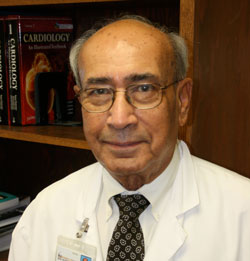
Kanu Chatterjee, who died on March 4 at age 81, was the finest clinical cardiologist any of us have ever seen. He was also one of the nicest, gentlest human beings. My favorite Kanu story came from my internship. My roommate, Ron, was on call in the CCU on his first night of his cardiology rotation. He admitted a boatload of patients, and was exhausted by the time morning rolled around (these were the days before limited duty hours).
Dr. Chatterjee was the attending, and there was always a gallery for his rounds – students, fellows, and faculty from around the world came to observe him teach and see patients. Everybody knew that Kanu prized the physical exam, which meant that Ron, bone tired, was going to have to perform a cardiac exam in front of the great Dr. Chatterjee and the entire peanut gallery. Kanu beckoned Ron to lead the pack into the first patient's room.
"Ron, please examine the patient," said Chatterjee, in his charming lilt born of his upbringing in Calcutta and schooling in London. Ron placed his stethoscope on the patient's chest.
"No," Kanu said softly. "We begin with palpation." Ron nervously put his hand on the patient's chest. Kanu, in turn, probably sensing Ron's anxiety, gently placed his hand on Ron's shoulder.
"Ron, do you feel the palpable S3?" asked Kanu.
"No," said Ron.
"Ron, I can feel it through your arm."
In the retelling, I wonder if the scene sounds arrogant or intimidating. I can assure you that it was anything but that. In fact, from a pedagogical point of view, it was extraordinary. Kanu's essential goodness, his gentleness, and his deep regard for his patients and trainees, meant that it was possible to give corrective feedback and for it to be welcomed, even enjoyed. And never forgotten.
Ellen Hughes
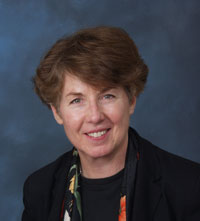
Ellen Hughes, who died on June 17th after a long battle with cancer, was a beloved DGIM faculty member who played a central role in establishing the Osher Center for Integrative Medicine. She was an extraordinary educator, the recipient of a half-dozen major teaching awards at UCSF. Shelly Adler, who worked with her at Osher, spoke for all of us when she said, "Any of you who have had the pleasure and honor of spending time with Ellen also know that she was generously wise, gracefully insightful, kindly humorous, and intuitively mindful." Personally, I will always treasure her warm smile – thinking back, I can't recall a time when she was anything but upbeat and loving, characteristics that endeared her to her patients, students, and colleagues. Her loss leaves a large hole in the heart of UCSF.
Julius Krevans
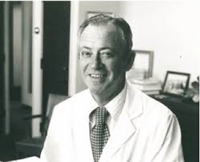
Julius Krevans, who died on July 12th at age 91, was UCSF's fifth chancellor. He was a hematologist and a member of our department. His legacy is that of a leader who made a difference. While he did many great things for UCSF (including ushering in UCSF's commanding role in biotech), perhaps his greatest was positioning us to be an international leader in HIV/AIDS, at a time when many other institutions were shying away from the disease and its stigmatized patient populations. I had the opportunity to work with Julie a bit when UCSF sponsored the 6th International AIDS Conference in 1990, and his support of the enterprise was unwavering, even after the conference became the object of an international boycott (when the US government placed travel restrictions on HIV positive individuals). Rather than cutting and running, Julie did the right thing, and the conference became a seminal event in the history of the fight against AIDS.
Dick Fine
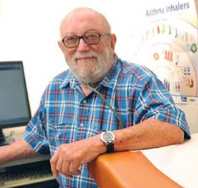
Speaking of moral courage, if you haven't watched the video that our SFGH colleagues, led by Dean Schillinger, made to honor the work and life of Dick Fine, I hope you will. It is a poignant, funny, and powerful look at a man who devoted his life to the patients, staff, and faculty at SFGH, and who served as the "moral compass" for that campus, and perhaps for all of UCSF. Dick was able to attend a recent ceremony at SFGH, where he was overjoyed to learn that the general medical clinic there has been renamed "The Richard Fine People's Clinic."
If you're pressed for time, there are three segments of the movie I'd point you to. Dick, as everybody knows, favored blue jeans, loud Hawaiian shirts, and turquoise jewelry. He also wore a Mickey Mouse earring. In the first scene (at 42:45 on the video), Dick's close colleague Bob Brody tells the story of when a new chief of medicine arrived at SFGH from Cornell. "We need a dress code," said the chief, hoping to emulate the East coast style he was comfortable with. "We referred him to the ‘Chair of the Dress Code Committee,' who was Dick," says Brody with a twinkle in his eye. "And we never heard another word about that."
The second is an interview with Grant Colfax, former White House AIDS czar and current health commissioner for Marin County (55:25). Grant recalled an episode during his internship, when he learned that one of his patients had hanged himself. He told Dick what happened. "And he didn't say anything, he just gave me a big hug. And I started crying, sort of like I am now…. It's something I'll always remember and be grateful for." The segment continues as Margot Kushel, current SFGH faculty member, described calling Dick (chief of staff at the time) after a patient of hers died from a medical error (56:25). "I read through all the charts, I know what happened, we can talk another time about what you could have done differently…. But I was really just worried about you." Margot continued. "What was so amazing was that he didn't try to pretend that we hadn't made mistakes.… [He said] this happens, and what matters is how you go on from here, how this changes you, how you do things differently… and if you're going to last as a physician, you can't give up.… It was a really powerful and important moment in my development as a doctor."
The third is an interview with Juanita Garcia, a former clerk at the clinic (47:43). "[Dr. Fine] would always tell us how good we were," she recalled, sweetly. "He was the one who mentored me, who taught me what to do at the clinic…. He doesn't seem like a doctor to me; he's just like my older brother… a really good brother."
George O'Keefe
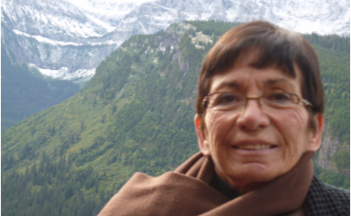
Which brings me, finally, to George O'Keefe. George was in charge of faculty affairs for the department of medicine in the 1980s and early 1990s. Faculty who worked with her recall her irreverent humor, her uncommon common sense, and her fierce advocacy for the department and our faculty. Last month, I sent a note to senior faculty about George's death, and received back an intense outpouring of support and affection, even among faculty who hadn't seen her for two decades. "George was the can-do person, finding solutions for problems with efficiency and her own brand of humor…. When her family celebrates her life, they should know her passionate work on our behalf has not been forgotten," wrote Flavio Vincenti. "Her laugh was infectious, her knowledge of everything was A+, and I know she loved Holly [Smith, the chair at the time], and all of us," added Nora Goldschlager.
These five individuals were different, but they shared many attributes that we can aspire to. They were all terrific at their jobs. They cared deeply about the mission of our department and of UCSF, and about their patients, trainees, and colleagues. They were larger than life, yet eminently approachable. To an impressive degree, they eschewed hierarchies, and recognized that everyone mattered, from the clerk in the clinic to the distinguished professor. And they created a sense of community, even family, in the workplace.
And, particularly in the case of Dick and George, they were also characters – highly distinctive individuals with unmistakable personas. I think it's gotten harder to be that way, not just at UCSF but everywhere. The rules are more stringent, the politics more divisive, the scrutiny more unforgiving. But I wonder whether we need to do more to encourage the unconventional person – and to convince him or her that UCSF is an environment that treasures diversity in all its flavors, including of personality.
What strikes me most is that – even in a huge organization spread out across half a dozen campuses – we are really nothing more than the sum total of the interactions we have and the people we touch, support, and inspire. In their deaths, these people continue to make UCSF better, by demonstrating what a professional life well lived looks like, and the kind of legacy it can leave behind. Particularly as we welcome many new faculty, fellows, and residents to our family this summer, it's a lesson worth remembering.

Robert Wachter, MD
Interim Chair, Department of Medicine